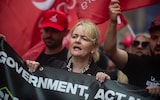NORWOOD, Mass. (AP) — Bored and looking for something to do this summer, Danny Doherty hatched a plan to raise money for his brother’s hockey team by selling homemade ice cream.
But a few days after setting up a stand and serving up vanilla, shaved chocolate and fluffernutter to about 20 people, Danny’s family received a letter from the Norwood Board of Health ordering it shut down. Town officials had received a complaint and said that the 12-year-old’s scheme violated the Massachusetts Food Code, a state regulation.
In this Saturday, Aug. 3, 2024 photo provided by Nancy Doherty, Ben Doherty, of Braintree, Mass., left, and his cousin Danny Doherty, 12, of Norwood, Mass., right, sit at a homemade ice cream stand near Danny’s home in Norwood. (Nancy Doherty via AP)
Danny Doherty, 12, of Norwood, Mass., stands for a photograph Wednesday, Aug. 21, 2024, in front of his home in Norwood, while holding a letter from the Town of Norwood Board of Health advising his family that they may not sell homemade ice cream at an ice cream stand near their home. (AP Photo/Steven Senne)
“I was surprised and upset,” he said of the letter that came Aug. 5. “I don’t understand because there are so many lemonade stands and they don’t get shut down.”
Danny’s mom, Nancy Doherty, who had encouraged her son to start the stand as long as he donated half of the proceeds to charity, also was taken aback.
“Somebody complained. That was the most disappointing part for us was that somebody thought it necessary to complain about a child’s stand,” she said. “It seemed a little, you know, crazy if you ask me.”
Rather than give up, Danny decided to give away the ice cream and accept donations for the Boston Bear Cubs, a team featuring players with physical and developmental disabilities — including his brother, who is autistic.
That’s when the neighborhood fundraiser blew up and became the talk of Norwood, a suburban town about an hour from Boston.
The first day they gave away the ice cream, supplies ran out in 10 minutes and $1,000 was raised. Then, word began to spread about the fundraiser and Danny’s clash with the town. Local media ran stories about the stand, prompting scores of local businesses to hold their own fundraisers for the hockey team.
In this Saturday, Aug. 10, 2024 photo provided by Meghan Doherty, Ben Doherty, 12, of Braintree, Mass., left, stands with his cousin Danny Doherty, 12, of Norwood, Mass., right, near a table for donations to the Boston Bear Cubs hockey team, in Norwood. (Meghan Doherty via AP)
Among them was Furlong’s Candies, which teamed up with Boston radio station WWBX-FM to hold a fundraiser in their parking lot. They raised $3,600 on a day when lines stretched out the door.
“Danny was trying to do a good thing for his brother’s team — and it’s not just a regular hockey team,” Nancy Thrasher, the store’s co-owner said. “They need a lot more equipment ... We were like this is a perfect situation for us to get involved in.”
Thrasher said she understood why the stand had to be shut down but she still felt bad.
“My heart broke for the kid. He was just trying to do good for his brother’s team,” she said.
Nancy Thrasher, co-owner of Furlong’s Candies & Ice Cream, stands near ice cream and toppings at the store, Wednesday, Aug. 21, 2024, in Norwood, Mass. (AP Photo/Michael Casey)
Town officials, meanwhile, said they received hate mail and death threats over the dispute, which they suggested has been badly mischaracterized in the media.
They argued the family had sold their homemade ice cream before and even promoted it on social media. The letter, officials said, was only sent after the town received several complaints and unsuccessfully tried to contact the family — something the Doherty’s dispute.
“We had to deal with staff who were upset that they were being threatened. People had gone online and found their addresses simply for sending a letter after having reached out to somebody and said, look, there’s a violation here,” said Tony Mazzucco, Norwood’s town manager. It’s the “first time in recent memory” that the town has shut down an ice cream stand, he said, adding that Massachusetts law allows for things like lemonade stands and bakes sales but not homemade ice cream.
Mazzucco also said there was a “legitimate health concern” since homemade ice cream can be contaminated with listeria monocytogenes or other bacteria.
Danny’s situation is not altogether unusual. Youth elsewhere have also seen their lemonade stands or pop-up bake sales shuttered — often for failing to have a business or health permit. Several states have responded by moving to lessen restrictions on such ventures.
Nancy Doherty said it was “distressing” to hear the town employees had received threats. She said the family had never sold ice cream before but acknowledged that Danny created an Instagram account to promote the stand.
“I’m not upset with the town for responding to a complaint,” she said. “I’m shocked someone complained. This was a tiny operation. Us serving 20 friends, family and neighbors isn’t a public health action. That is someone complaining to be a complainer.”
For Danny, all the attention has been a little unnerving. “There were so many people and then they started chanting my name,” he said of the fundraiser at Furlong’s. “I didn’t like it, so I ran away. All the attention was on me and I didn’t like it.”
In the end, about $20,000 was raised for the hockey team — more than the amount the club spends in an entire year. The infusion of funds should ensure the club will be on “sound financial footing” for the next decade or more.
Lori Talanian, right, director of corporate partnerships at Ira Cars, hugs John Quill, center, director and coach of the Boston Bear Cubs hockey team, Wednesday, Aug. 21, 2024, after her company presented the team with a donation of $3,900, at the Doherty family home, in Norwood, Mass. (AP Photo/Rodrique Ngowi)
“The community response has overwhelmed us,” said John Quill, the director and coach of the Boston Bear Cubs, as he accepted a check from an auto group at the Dohertys’ house.
“There are a lot of good people out there,” Quill added. “Danny inspired a whole lot of people to do good and to be kind and to help us out.”
Casey writes about the environment, housing and inequality for The Associated Press. He lives in Boston.Disclaimer: The copyright of this article belongs to the original author. Reposting this article is solely for the purpose of information dissemination and does not constitute any investment advice. If there is any infringement, please contact us immediately. We will make corrections or deletions as necessary. Thank you.



